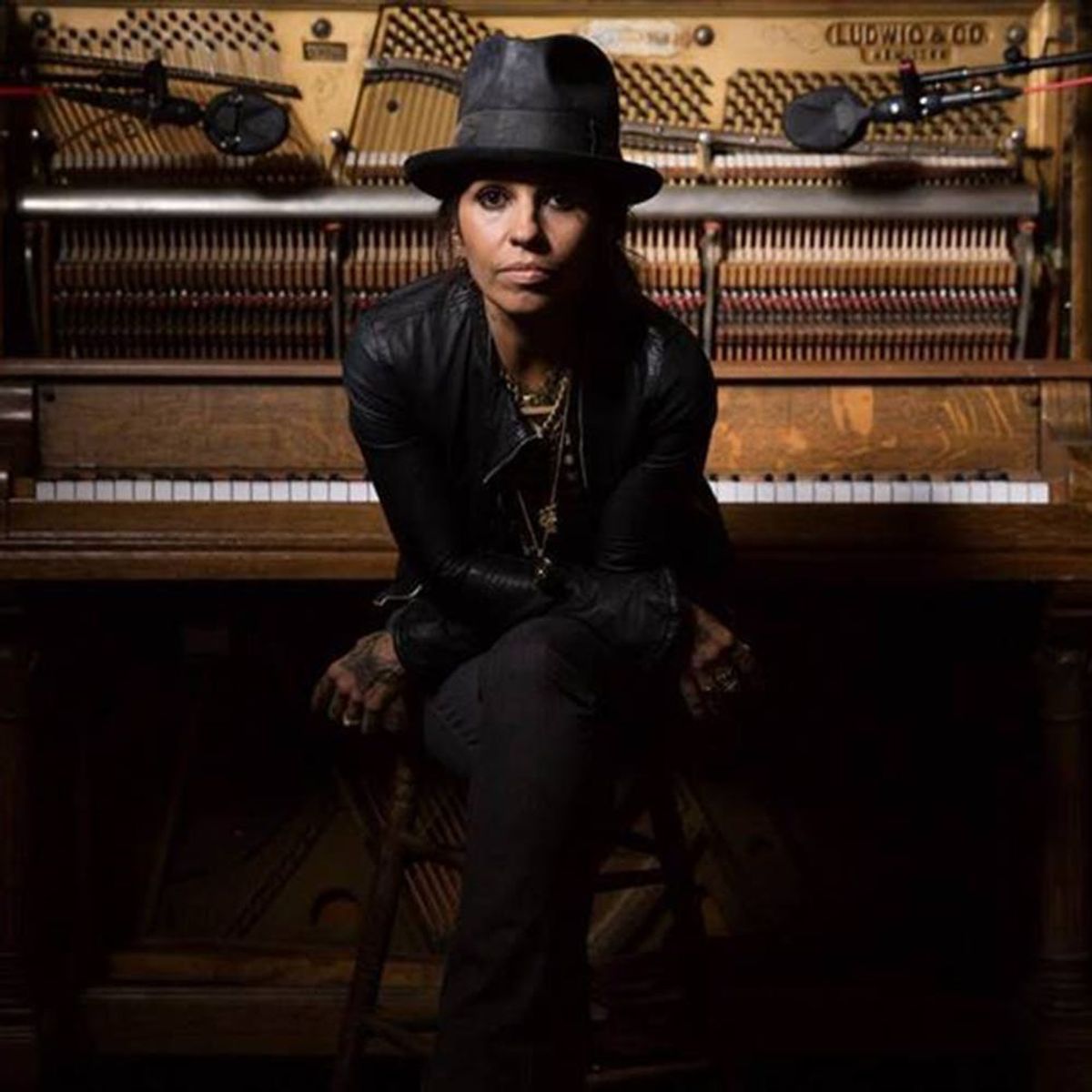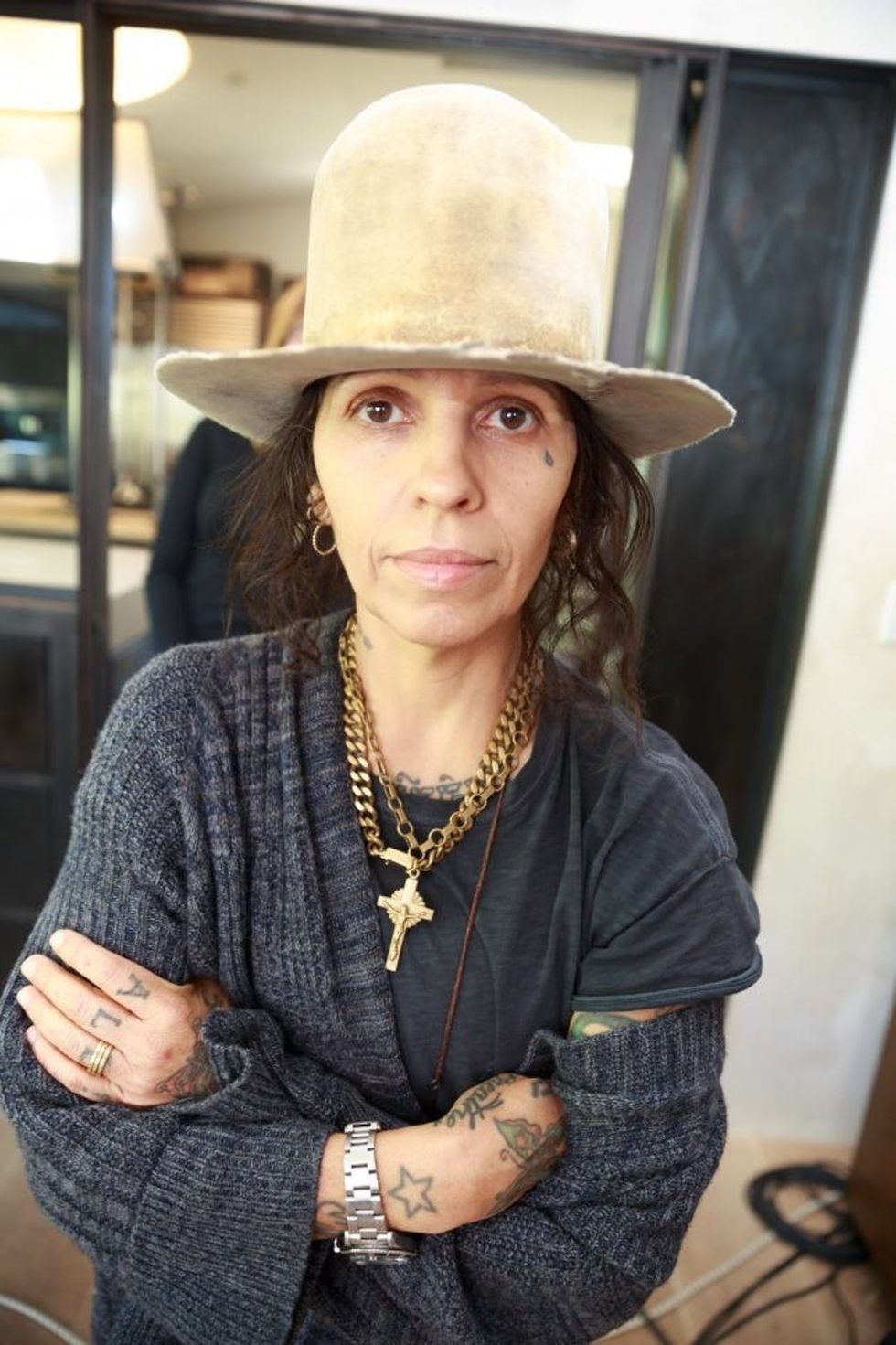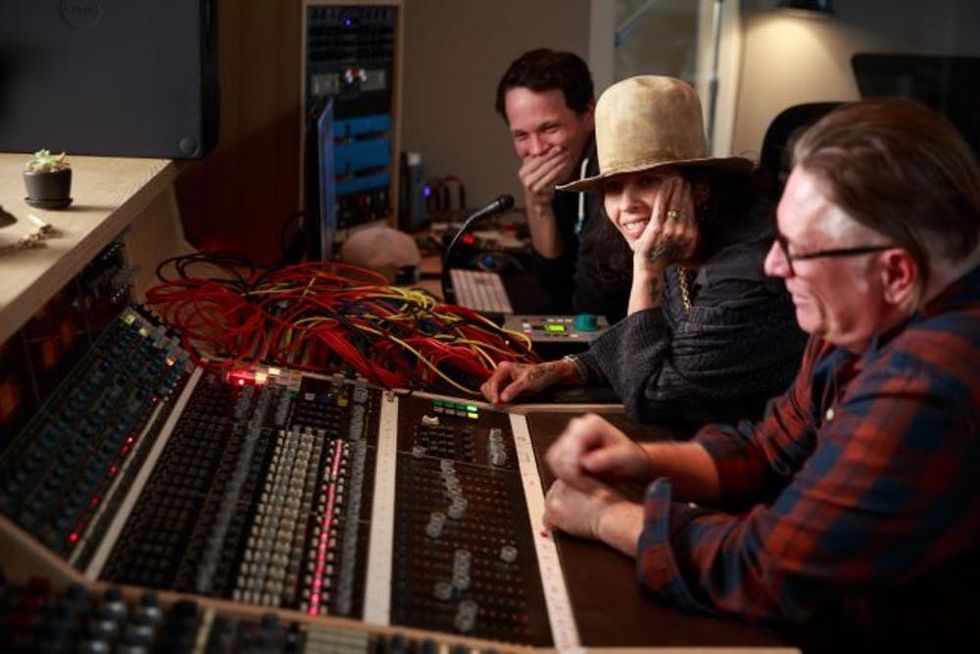Rockstar Linda Perry on Why She’s Always Backing the Underdog

The next time you’re jamming to feminist anthems on Spotify, know that you’re probably listening to a track that was touched by Linda Perry. Perry is the brains behind some of the most kickass tunes of our time, from “Beautiful” by Christina Aguilera to “Superwoman” by Alicia Keys. After starting off her hustle in the band 4 Non Blondes and subsequently pursuing a solo career, Perry has written hit songs for some of the most notable artists in the world, a talent that led to her induction into the Songwriters Hall of Fame in 2015. Today, Perry is turning her focus to supporting up-and-coming artists from the ground up with her new label We Are Hear. In partnership with Intuit’s Backing You campaign, she’s also helping kickstart the career of an outstanding artist named Willa Amai who’s already set to blow up the music industry at just 13 years old (you probably heard her incredible rendition of Daft Punk’s “Harder, Better, Faster, Stronger” during a QuickBooks commercial that aired during this year’s Grammy Awards). We chatted with Perry about how the music industry is changing, including why labels need to start backing the underdog and why it’s time for the people behind the music to have their turn in the spotlight.

Brit + Co: As someone who has worn many hats in the music industry (as a band member, solo artist, songwriter, and producer), how do you feel the role of music artist has changed since your first hit exploded with 4 Non Blondes?
Linda Perry: The role of the artist? Well, that’s an ongoing scenario; it keeps changing because the business keeps changing. That’s basically why me and my partner Kerry started a company called We Are Hear — because we wanted to help fulfill other artists’ vision. We consider ourselves a creative energy brand where we see what [the artist] wants to do, and we’re behind you to help motivate you, to help fulfill the vision, and to be supportive, to develop — and that doesn’t happen anymore. Right now, the artists are basically being thrown in with these huge companies. They throw them out there and if it doesn’t stick, that’s it, they move onto the next one.
B+C: Can you talk a little about the growing number of independent workers in the music industry?
LP: Well, there have always been a lot of independent workers. Remember the ’80s? The ’80s were really awesome. There were really great bands and the industry was booming, and then the ’90s showed up. The people in the ’90s, they didn’t want to be on labels; they wanted to be cool and they wanted to be underground and independent like Nirvana, Sound Garden, and all those guys. The indie labels rose because they were the ones who were signing these acts, and the labels were still trying to make a living off of Men at Work or whatever and that sound was going out. You’ve got all these indie labels like Sub Pop, Caroline, whatever, that are coming up, and they have this huge success with all these major bands. Then what happened [was] the big labels went and bought up the indies.
That’s kind of happening again right now. The difference today is that there is more support for these indie artists and small businesses like We Are Hear. A perfect example is QuickBooks. We don’t have the time to do all this accounting and invoicing because when you’re a small business all hands are on deck and you’re working, you’re pushing, you’re moving fast because you don’t have that many people. And so software like QuickBooks comes in and it helps us manage our invoices, and does all this stuff for us that we normally would probably[…] screw up. We’re not a big business, so we can’t afford having these suits in a luxurious office counting change and not paying anybody because it takes forever for those guys. The funny part is that those guys have money but they take forever to pay out. So when my band or someone plays for me on an album or anything, we pop it in QuickBooks, type up the invoice, and they get paid right away. And people are really liking that about it, so, you know, the indies are better right now because there’s better support.

B+C: So you think it’s easier for independent artists to succeed today than it was previously?
LP: Oh absolutely, I do believe so. Well, also you have all the social media, you have all that. You can poop on your YouTube channel and get signed. I don’t get it, I don’t, trust me, I’m not a fan of that. I’m a fan of real artists, having a purpose with your music, having a purpose with your company, having direction. And everything we do is to serve what we love, and that’s music. So it’s very important. We started We Are Hear because I don’t want to be microwave popcorn — I don’t want to throw out a band that’s just good for one shot and then you’re on to the next one. It just doesn’t feel good, and I’m an artist, my partner Kerry, he’s an artist, and we want to support the artist. We want to support the underdog.
B+C: So was supporting the underdog the driving motivation when you decided to start your own label?
LP: Oh yeah. We had many, many conversations about how the labels are not developing artists anymore, they are not embracing the art. I’ve had so many people that I’ve worked with come to me and say “I hate my record, I didn’t want to do this, the label made me do it,” and I say, you know what, it’s your fault. The label won’t do anything that you won’t let them do.
So Kerry and I want to be a place kids can come and get inspired, and we will help them if we believe in them (of course, we have to believe in them and feel like there’s talent there), but we manage artists, we manage songwriters, we’re a creative team — I mean, we kick ass. Honestly, we’re really kicking ass.
B+C: One of the first major projects for We Are Hear was producing and releasing the soundtrack album for Served Like a Girl, a documentary film that brings awareness to the very real struggles of female veterans. What made you decide to take on this specific project?
LP: Well, again, I’m a big fan of the underdog. You’ll find me hanging out with the underdogs always. That was a project that when it was brought to me, there was very little money behind it, and we’re talking about more than 55,000 women out on the street right now are veterans. And these women, some of them do three terms for seven or eight years, and when they come back they go to the VA and they’re turned away, and they tell them that there are no benefits for women and they go to welfare. Now, mind you, not that the benefits for men are outstandingly great, but at least they’re getting something — women don’t get anything. So I wanted to be a part of that because I wanted that to be known, I wanted to get that out there. So that’s why we got behind that project: to help spread the word.
B+C: You’re written some extremely popular feminist anthems during your career — including “What’s Up“(4 Non Blondes), “Beautiful“ (Christina Aguilera), “Superwoman“(Alicia Keys), and “Shine“ (Pat Benatar), a song you wrote and produced specifically as an anthem to accompany the Women’s March on Washington. What are your thoughts about the fusion of music and protest, especially in today’s political and social climate?
LP: I don’t know how many people are going to be a fan of what I’m about to say, but listen: With the good there comes bad, with the bad comes good. Right now, we’re with the bad comes the good, and we just have to stay focused because we have a very serious situation happening in this country and in the world. What we need to focus on is that through this, people are awake — they’re coming together, they’re unifying, they’re joining hands. It’s becoming a very, very powerful situation out there, and punk rock is going to come back, the Patti Smiths and Ani DiFrancos. People are going to start getting more political with their songs, and just be more free. I mean, to me, it’s equivalent to Vietnam and the ’60s. It’s like right now we are having a very big [moment] of people joining forces and saying “no f***ing way, not on my f***ing dime anymore.” That’s what we have to support as a country.

B+C: Can you talk a little about your partnership with Intuit on the Backing You campaign?
LP: Honestly, this is going to sound very cheesy, but I love these guys. I mean, we have this artist Willa and we played this showcase and they freaked out on Willa and they approached us and said, we have this commercial — we’ve been looking for this voice. Willa, she’s 13 now and 12 when I found her — and I didn’t even find her, a friend of my wife’s asked me to come see if I thought this girl had any talent — and she literally played me half a song and I just had a feeling about her. Then I told her to call me in February, and that she needed to write some songs. So she called me, and we just started working together, but not working together [in the traditional sense] — she’s 13, you can’t push a 13-year-old. You just have to open up the house and let them see what they’re capable of doing, and that’s what we’ve been doing. She’s just been writing.
But anyway, when we did this, QuickBooks came to us and they brought this commercial and we were like, YES! [We couldn’t get over] the fact that we [already] used QuickBooks and we love it. I’m terrible — I don’t even know what two plus two is — don’t even put any checks in my hand [or] put any numbers in my brain… I’m a musician one hundred percent, all the way. One thing about QuickBooks is that they are backing [the independent artists]. So we’re supporting the artist and QuickBooks is supporting us. I mean, I love them. I can’t say enough about them.
B+C: As a part of the Intuit campaign, you also released a documentary-style commercial during the Grammy Awards called “Backing the Small Businesses Behind the Music” featuring Willa Amai.
LP: Basically the whole thing is about “Backing You,” and so Willa — she’s not a big artist, she’s just starting out, and she’s amazing. It’s a behind-the-scenes. We always see what happens to the artist when they win their Grammys and they have their big houses and their fancy cars and their makeup line. We rarely [see] what happens before that, and so the whole commercial and the campaign [features] the engineer sitting at the microphone, the person bringing the food, the photographer taking a picture of Willa. Then it goes to the creative director that turns it into a poster, then it goes into the hand of the girl that puts the poster on the wall. It goes from her singing the song acapella, in front of a microphone into the speakers, into the control room. So you can get an idea of the team behind the scenes.
There is a team that’s working with everyone — these artists don’t just happen. It’s not like little magic elves sprinkle dust on them and then all of a sudden they are on the radio. There’s a massive team and a lot of work that goes into it, and I loved it. When they told us this, it was so brilliant to me. So that’s what the commercial is about. And, I mean, it looks really great, they did an amazing job, and I think it’s very inventive and I feel it’s really going to change a lot —the perspective of music.
B+C: As a notable songwriter who’s been in the business for years, has your creative process changed at all?
LP: With age, you just change, you know? I don’t even have a choice, it’s just happening. So it is true, the older you get, the wiser you get, and you start seeing things a little clearer. When I was younger, I had a lot of ego, but not the right kind of ego; it was ego to defend and control. Now my ego is of confidence, and I let go more because I’m confident — I don’t need to hold on because I know what I do. So having that kind of perspective really opens up my creative tunnel, and I’m on fire right now. I mean, I’m doing some incredible things, my energy is clear, and I’m focused. I think I’m just getting really good at what I do, and I feel like if my career were ten steps of a ladder, I feel like right now I’m on four, and I have so much farther to go. It feels good.
B+C: What’s the best piece of advice you’ve ever received in your career?
LP: That’s so easy, because it’s always right here, right in front of me right now. When I was in 4 Non Blondes, every time I asked a question, the producer of the record company would say “Can’t you just be an artist? You don’t need to know that right now.” And I just wanted to know why my guitar sounded so thin, when it sounded so fat in the live room, and I was just curious. So I left the band and then I was chatting with this producer Bill Bottrell, and I asked him a bunch of questions when I was working on this solo album called In Flight. I asked so many questions that he literally picked me up and put me in a seat, and he said: “this is your EQ, these are your highs, your lows, your mids, over here are compressors, these are your effects.” And I’m like “oh my god, what is all this?!” And he said, “Turn the knob until it sounds good to your ear.” I’ve been turning knobs my whole career. In my life, it’s just what I do. I turn knobs until it sounds good or feels good.
Have you watched the Backing You commercial featuring Linda Perry and up-and-coming artist Willa Amai yet? Tweet us your thoughts by mentioning @BritandCo.
(Photos via Kristin Burns)



















